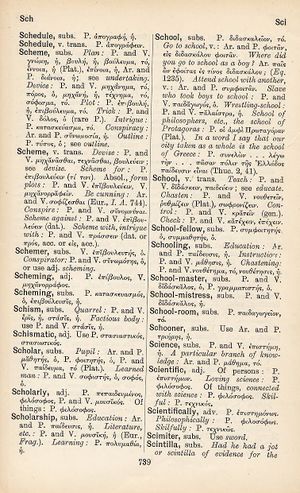scintilla
κακοὶ μάρτυρες ἀνθρώποισιν ὀφθαλμοὶ καὶ ὦτα βαρβάρους ψυχὰς ἐχόντων → eyes and ears are poor witnesses for men if their souls do not understand the language (Heraclitus Phil.: Fr. B 107; Testimonia: Fragment 16, line 6)
English > Greek (Woodhouse)
subs.
Had he had a jot or scintilla of evidence for the charges he trumped up against me would he have allowed this? P. ἆρʼ ἂν εἴ γʼ εἶχε στιγμὴν ἢ σκιὰν τούτων ὧν κατεσκεύαζε κατʼ ἐμοῦ τοῦτʼ ἂν εἴασε (Dem. 552).
Latin > English (Lewis & Short)
scintilla: ae, f.
dim. kindr. with σπινθήρ,
I a spark (class.).
I Lit.; sing.: videmus Accedere ex unā scintillā incendia passim, Lucr. 5, 609; 4, 606; Verg. A. 1, 174; Ov. M. 7, 80; Liv. 38, 7 al.: parva saepe scintilla contempta excitavit incendium, Curt. 6, 3, 11.—Plur., Lucr. 2, 675; 6, 163; Verg. A. 12, 102; Quint. 8, 5, 29 al.—
B Transf., a bright, sparkling point: nullis ut in auro lucentibus scintillis, Plin. 33, 6, 31, § 95.—
II Trop., a spark, glimmer, faint trace: scintilla ingenii, Cic. Rep. 2, 21, 31: belli, id. Fam. 10, 14, 2: isti tantis offusis tenebris ne scintillam quidem ullam nobis ad dispiciendum reliquerunt, id. Ac. 2, 19, 61: ne scintillam quidem relinques, genus qui congliscat tuom, Plaut. Trin. 3, 2, 52.
Latin > French (Gaffiot 2016)
scintilla,¹² æ, f., étincelle : Lucr. 5, 609, etc.; Virg. En. 1, 174 ; Curt. 6, 3, 11 || point brillant [dans une pierre] : Plin. 33, 95 || [fig.] Cic. Fam. 10, 14, 2 ; Rep. 2, 37 ; ne scintillam quidem relinques, genus qui congliscat tuum Pl. Trin. 678, tu ne laisseras même pas une étincelle [un rejeton] pour ranimer ta race.

